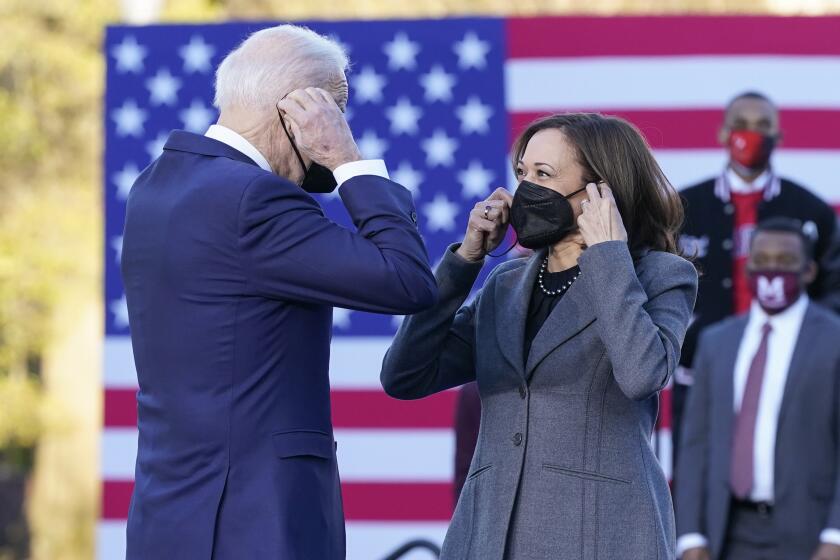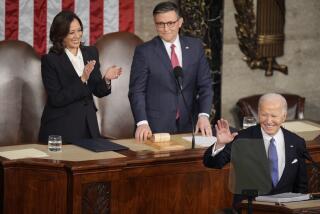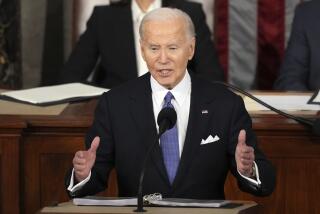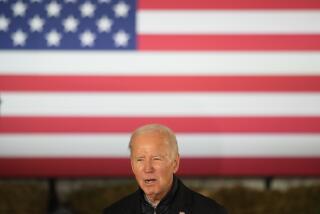Biden reviews first year of ‘challenges but also enormous progress’

President Biden touted his administration’s “enormous progress” in its first year and insisted he did not “overpromise” to the American people during a news conference marking one year in office.
President Biden on Wednesday took stock of his first year in office as one of “challenges but also enormous progress,” telling reporters he would restart efforts to pass his signature legislative agenda and use the midterm election campaigns to push harder against Republican obstinacy.
“For all this progress, I know there’s a lot of frustration and fatigue in this country,” Biden said during a news conference at the White House, acknowledging that the deadly and persistent COVID-19 pandemic and runaway inflation were taking a toll on the American psyche. Even so, he expressed confidence that the administration’s pandemic response and the country were moving in the right direction.
“We have faced some of the biggest challenges that we have ever faced these past few years,” Biden said. “Not only are we getting through it, we’re laying the foundation for the future.”
Biden, who took office on Jan. 20 a year ago, said he would rely on help from the Federal Reserve to combat historic inflation and promised the new infrastructure law would “supercharge” efforts to cure supply-chain lags that have led to some empty store shelves.
He sought to revive flagging confidence within his party about salvaging a major domestic spending proposal and congressional Democrats’ ability to run for reelection in the face of an expected GOP wave this fall. Vowing to hit the road more often in coming months, the president said he would take the fight directly to a Republican Party that has nearly monolithically opposed his agenda.
A 36-year veteran of the Senate who ran on a claim he could restore a degree of bipartisanship, Biden marveled several times at the GOP’s obstinacy — “What are they for?” he mused in a hushed voice — and explicitly acknowledged former President Trump’s iron grip on his party. “Did you ever think that one man, out of office, could intimidate an entire party where they’re unwilling to take any vote contrary to what he thinks should be taken, for fear of being defeated in a primary?”
Activists warn that the failure to deliver on promises to Black voters could hurt Democrats in the midterm election.
Biden also sought to defuse tension with Russia, suggesting a “minor incursion” in Ukraine would spark less reaction than a full invasion and offering some concessions to Russian President Vladimir Putin in exchange for backing down from a larger confrontation, including an expectation that Ukraine would not join NATO “in the near term.”
But Biden sounded pessimistic about his ability to deter the Russian leader with threats of economic sanctions, which he said would be far more severe than what Russia faced after its 2014 invasion of Crimea.
“Do I think he’ll test the West, test the United States and NATO, as significantly as he can? Yes, I think he will,” said Biden, who attended a summit with Putin in June and held two recent calls with his Russian counterpart. “But I think he will pay a serious and dear price for it that he doesn’t think now will cost him what it’s going to cost him. And I think he will regret having done it.”
Biden offered tempered optimism about his main unfinished domestic priorities — federal voting rights legislation and a major domestic spending program with investments to combat climate change and provide financial relief for working families. Both initiatives have stalled in the evenly divided Senate, where the White House has been unable to persuade two moderate Democrats to get on board.
Those senators, Joe Manchin III of West Virginia and Kyrsten Sinema of Arizona, stand apart from their 48 other Democratic colleagues in refusing to change Senate rules requiring 60 votes to pass voting rights bills.
Senate Majority Leader Charles E. Schumer (D-N.Y.) forced a vote on that procedural change Wednesday evening, although it failed as Manchin and Sinema held firm, voting along with the 50 Senate Republicans to keep the current rules in place.
Manchin, who served in the Senate alongside Biden, has also been the main impediment to the president’s domestic spending program, dubbed “Build Back Better.” After months of negotiations, Manchin took the White House by surprise last month when he announced in a TV interview that he could not support the legislation.
Biden said he was confident about working out an agreement with Manchin — the rare Democrat representing a state that voted overwhelmingly for President Trump in 2020 — to salvage at least part of the $1.7-trillion package.
“We’re probably going to have to break it up,” he said, referring to Build Back Better. He noted there was “clear” and broad support for the $500-billion earmarked for efforts to reduce carbon emissions and subsidies for preschool and child care. Pressed further, Biden acknowledged that other major components, an extension of a child tax credit and subsidies for community college, may have to be cut to secure a deal.
Addressing the frustrations of Black voters, Biden insisted he “has their back” but showed contrition for not having been more vocal and visible on the issue of voting rights. A Democratic effort to advance voting rights legislation died in the Senate on Wednesday night.
“That is a problem that is my own making by not communicating as much as I should have,” he said, promising to hit the road more in his second year.
Biden also expressed support for Vice President Kamala Harris and sought to quell speculation that she could be replaced on the ticket should he seek reelection in 2024. “She’s going to be my running mate,” he said.
Interestingly, Biden did not get a single question on immigration, a topic that dominated his first news conference last March.
Overall, Biden has struggled early on to lend credence to the central pillars of his candidacy. He had promised to ease political polarization and unify an atomized country, and prove to the world that democracies can deliver for people more effectively than autocracies.
“I didn’t overpromise,” Biden said in response to a question about his first-year stumbles. But he added that he wished “my Republican friends” would “get in the game of making things better in this country.”
A year after the Jan. 6, 2021, insurrection at the U.S. Capitol, only a quarter of Republicans accept Biden as the legitimately elected president. And only two GOP lawmakers are participating in the House investigation of the events of that day, leaving Biden to lament that the country is “not nearly as unified as it should be” and waxing about the entrenched polarization, which he blamed in part on the advent of partisan media and misinformation.
“Unless you can reach consensus in democracy, you cannot sustain democracy,” he said. “So this is a real test.”
Framing his work as unfinished, Biden tried repeatedly to layer over his grimmer assessments with confidence about the country’s general course and his ability to convince voters in the coming months.
“What is the trajectory of the country? Is it moving in the right direction?” he said. “I don’t know how you can say it’s not.”
More to Read
Get the L.A. Times Politics newsletter
Deeply reported insights into legislation, politics and policy from Sacramento, Washington and beyond. In your inbox three times per week.
You may occasionally receive promotional content from the Los Angeles Times.









